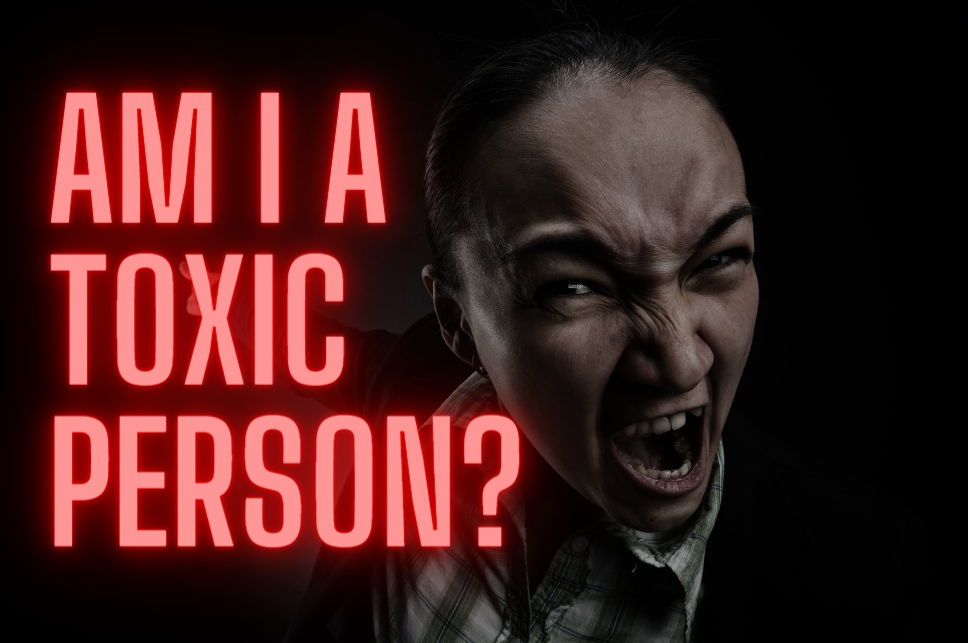
Introduction
Ever heard the term ‘toxic person’ being thrown around? Or perhaps, you’ve even wondered to yourself, “Am I a toxic person?” It’s a tough question to ask ourselves, but self-reflection is a crucial step towards personal growth, and we’re here to navigate it together.
A ‘toxic person’, as it’s often used in popular psychology, refers to someone whose behavior consistently brings negative effects on others’ emotional wellbeing. This can come in a multitude of forms and intensities, from mild and subtle, to severe and overt. But before you panic, remember this – nobody is perfect. We’ve all exhibited toxic traits at one point or another in our lives. The key is to identify these behaviors and work towards changing them for the better.
Understanding how our actions and attitudes impact others is not only essential for our relationships – be it friendships, family ties, or romantic connections – but also for our personal growth. Why? Because knowing ourselves better, with our strengths and our flaws, is the first step to becoming the best versions of ourselves. So let’s journey into understanding more about toxic behaviors, shall we?
Understanding Toxic Behavior
Let’s get into the heart of the matter – what exactly is toxic behavior? It can be a tricky term to pin down because it involves a broad spectrum of actions and attitudes that can have detrimental effects on others (and on ourselves!). But don’t worry, we’re going to break it down together.
At its core, toxic behavior can be defined as actions that are harmful, destructive, or damaging to others, and often, to oneself as well. It can range from subtle actions like constant criticism or passive-aggressive comments, all the way to more overt actions like manipulation or physical aggression.
Often, we might not even realize that our actions could be causing harm. And that’s okay, the important thing is that we’re here now, working to better understand ourselves and how we interact with others.
So why is it crucial to be aware of our toxic behaviors? Well, they can have profound effects on our relationships and personal well-being. They might strain our friendships, create tension in our families, or even sabotage our work relationships. Plus, engaging in toxic behavior can also take a toll on our mental health, fostering feelings of guilt, frustration, and loneliness.
Remember, recognizing our own toxic behaviors isn’t about feeling guilty or blaming ourselves. Instead, it’s about growing, changing, and becoming more compassionate individuals. We’re all human, and we all make mistakes. The key is to learn from them, and that’s what we’re here to do! So let’s take the next step and explore the signs that we may be engaging in toxic behavior. Are you ready?
10 Signs You May Be Engaging in Toxic Behavior
Here, we’ll outline 10 signs that may indicate that you’re engaging in toxic behavior. Remember, no judgement here, only opportunities for personal growth. Let’s delve in.
Constantly Criticizing Others: We all have our opinions, but if you often find yourself criticizing others (their actions, looks, choices) in a non-constructive way, it might be time to reconsider your approach.
Difficulty Apologizing: We all make mistakes, it’s a part of being human! If you find it hard to admit your wrongdoings and say ‘sorry’, it might be something to reflect upon.
Manipulative Behavior: This includes using guilt trips, twisting truths, or other tactics to get people to do what you want. It’s important to recognize that manipulation is not a healthy form of communication.
Being Overly Controlling: Wanting things done a specific way is not inherently bad, but forcing your ways on others or not allowing them to express themselves is.
Always Playing the Victim: If you often find yourself portraying yourself as the ‘victim’ in various situations, even when you’re at fault, it’s time to pause and reassess.
Neglecting Others’ Feelings and Needs: It’s crucial to remember that relationships are about mutual respect and understanding. Ignoring or dismissing others’ emotions can be hurtful.
Frequent Lying: Honesty is the foundation of any relationship. If you often lie, even about small things, it could indicate a toxic behaviour.
Having Frequent Explosive Outbursts: It’s normal to get angry, but if it’s frequent and disproportional, it can create an unhealthy environment for you and others.
Habitual Gossiping: Occasional gossip might be normal, but frequent negative talking about others when they’re not around can be harmful.
Lack of Empathy: If you find it hard to understand or share the feelings of others, it might be time to work on your empathy skills.
Remember, spotting these signs in yourself doesn’t mean you’re a ‘bad’ person. It simply means that there are areas in your life where you can grow and improve. And that’s a beautiful thing! We’re all works in progress, continually learning and growing.
The Impact of Toxic Behavior on Relationships
It takes a lot of courage to look within ourselves and identify areas of improvement. Now, let’s delve into how these toxic behaviors can impact our relationships and why it’s so crucial to address them.
Firstly, it’s important to recognize that toxic behavior can put a strain on all types of relationships, be it professional, personal, or familial. Constant criticism, for example, can make colleagues feel unappreciated and undervalued. Manipulative tactics can cause trust issues in friendships or romantic relationships. Over-controlling behavior can create tension and stifles growth in any setting.
Moreover, toxic behavior can have long-lasting effects on our mental and emotional health. Engaging in such behaviors often leaves us feeling guilty, frustrated, or lonely in the long run. It can also lead to a decrease in self-esteem and create a cycle of negativity that’s hard to break.
But guess what? Recognizing this is the first step towards making positive changes! And remember, the fact that you’re here, ready to learn and grow, shows how incredible you truly are. It shows your resilience and your commitment to becoming a better version of yourself.
How to Stop Engaging in Toxic Behavior
Now that we’ve identified some potential signs of toxic behavior, let’s focus on ways to transform these behaviors into healthier habits. It’s not an overnight process, but with patience and persistence, change is definitely within your reach. Let’s get started:
Acknowledge Your Behavior: This is the first and crucial step. Recognize your behaviors without judging yourself too harshly. Remember, it’s not about guilt, but about understanding and growth.
Seek Feedback from Trusted Individuals: Talk to people who know you well and are willing to provide honest feedback. They can give valuable insights into how your behavior might be impacting them or others around you.
Practice Empathy and Active Listening: Try to put yourself in others’ shoes and listen to their perspectives without interrupting or judging. It’s a great way to understand and appreciate their feelings better.
Set Boundaries and Respect Others’ Boundaries: Understand your limits, communicate them, and learn to respect the boundaries set by others as well. This is key to maintaining healthy relationships.
Work on Emotional Intelligence: Emotional intelligence involves understanding your emotions and those of others, managing your emotions effectively, and using this understanding to interact positively with others.
Consider Therapy or Counselling: Don’t hesitate to seek professional help if you feel you need it. Therapists and counsellors are trained to help you navigate through your emotions and behaviors, providing you with tools and strategies to manage them.
Practice Patience and Consistency in Change: Change doesn’t happen overnight. Be patient with yourself and keep working consistently towards your goal. Remember, progress, no matter how small, is still progress!
You’re on a brave journey towards personal growth and healthier relationships. It’s a journey worth taking.
Conclusion
We’ve covered a lot of ground in this post – from defining toxic behaviour, recognizing its signs in ourselves, understanding its impacts on our relationships and mental health, to finding ways to bring about positive change. Take a moment to acknowledge the courage and openness it took to engage with all of this.
In striving to become better versions of ourselves, it’s vital to remember that we’re all works in progress. Everyone has areas they can work on and improve. If you’ve seen yourself in any of these toxic behaviours, remember – it’s not about guilt, it’s about recognizing the areas you can grow in and taking steps to do so.
And hey, if the journey feels tough at times, remember that it’s okay to reach out for help. Trusted friends, loved ones, or professionals can provide support and guidance along the way.
Lastly, remember that progress isn’t linear. There will be days when you stumble, and that’s okay. What matters is that you’re committed to growing, learning, and moving forward. Celebrate your small victories along the way, because each step, no matter how small, brings you closer to becoming the best version of yourself.
So, here’s to you – for being brave, for being open to growth, and for embarking on this journey to healthier relationships and a healthier you. Keep going. You’ve got this!




